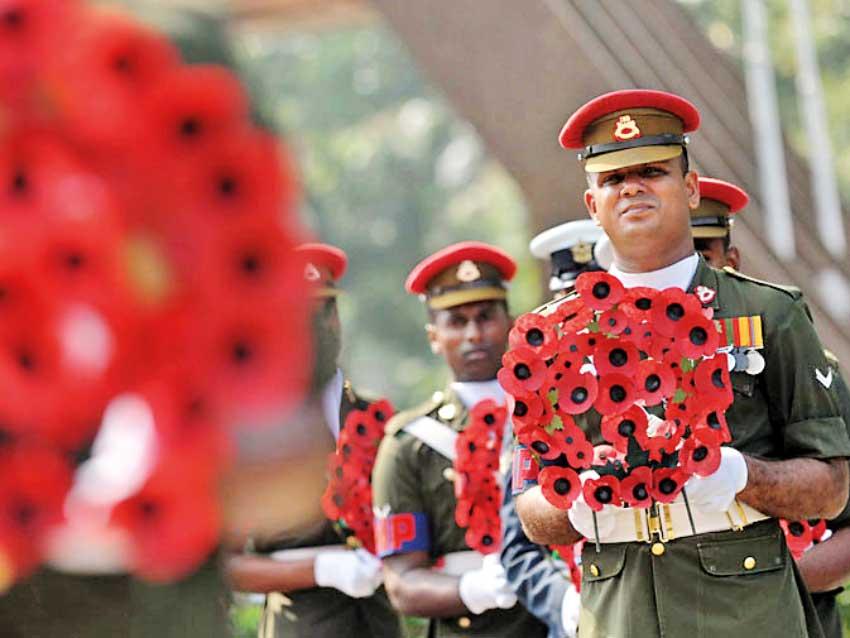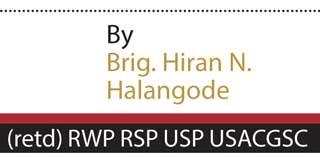Reply To:
Name - Reply Comment

Annually on November 11, Britain and the Commonwealth countries remember their war dead
In Sri Lanka the ceremony is held annually with the support of the RCEL
 This year the Armed Forces Remembrance Day and Poppy ceremony are due to be held on November 13 (Sunday) at the Viharamahadevi Park in Colombo. Since November is the month of Remembrance universally it is commemorated world over.
This year the Armed Forces Remembrance Day and Poppy ceremony are due to be held on November 13 (Sunday) at the Viharamahadevi Park in Colombo. Since November is the month of Remembrance universally it is commemorated world over.
Each year on November 11, Britain and the Commonwealth countries remember their war dead in a formal manner by laying Poppy wreaths at their respective national war memorials and war graves related to those fallen in battle or died while in service during the two World Wars. The signing of the Armistice was at 11.00 a.m. on November 11, 1918 with the end of World War 1. Hence this day is considered as the Remembrance Day.
In Sri Lanka the ceremony is held annually with the support of the RCEL (Royal Commonwealth Ex-Services League) who donate a million poppies to the SLESA (Sri Lanka Ex Servicemens’ Association) which through its sale provides the financial assistance, medical aid and nourishment to the needy, ageing, infirm, and destitute Ex Servicemen. Sadly certain governments in the past taxed the donation of poppies and deprived the full benefit of the donation reaching the needy Ex Servicemen.
The SLESA with over 45,000 members at present provide financial assistance to its needy members for their medical requirements like spectacles, hearing aids, minor surgeries and scholarships for their children’s education. They also maintain two Homes for the aged in Bolagala off Negombo and another at Katugastota. The state sadly has neglected these veterans; hence the Poppy appeal is the main source of income for its members. The Poppy appeal is commemorated at the War Memorial on the nearest Sunday to 11th November by the Sri Lanka Ex Servicemens’ Association annually.
The War Memorial at the Viharamahadevi Park, Colombo consists of the Cenotaph (empty tomb) and its Memorial Wall (backdrop). The sole purposes of these two structures are as follows, The Cenotaph is in remembrance of the fallen 442 volunteers of the estimated total of 1,250 volunteers from Sri Lanka (then Ceylon) who joined the British and Commonwealth forces to fight in World War I (1914-1918).
A significant achievement has been that 330 schoolboy cadets of 4 English speaking schools (Royal, St Thomas’, Kingswood and Trinity) went to Europe to fight in WW 1 where 45 of them were Killed in Action and many more were wounded and suffered mental and physical disorders later in life.
The Memorial Wall (backdrop) to the Cenotaph is in remembrance of the fallen 46 volunteers of the estimated total of 47,260 volunteers from Ceylon who joined the British and Commonwealth forces to fight in World War II (1939-1945). These volunteers have served on the ground, at sea and in the air as follows,
The British Army 6,000 (4,000 for overseas service and 2,000 for local service) Ceylon Defence Force (CDF) - 40,000, Ceylon Royal Naval Volunteer Reserve (CRNVR) - 1,200, Royal Air Force (RAF) – 60 The foundation stone for the monument was laid by the Governor, Brigadier General Sir William Henry Manning on December 7th, 1921. The Column was constructed of the best Sholinghur (a district 30 miles north of Madras) granite 119 feet 6 inches in height and seven feet in diameter.
With the outbreak of the Second World War in 1939, it was decided that the Victory Column on the Galle Face esplanade would be a notable landmark to enemy aircraft and thus it had to be dismantled. After much deliberation, it was finally decided to erect it at its present location- then known as the Victoria Park.
The war monument which is of archaeological value has been renovated by the Sri Lanka Ex-Servicemen’s Association (SLESA) with the assistance of the Sri Lanka Navy. However, of late the Cenotaph has been neglected due to officialdom, indifference and lethargy on the part of those responsible. It sadly resembles a relic of our colonial past.
Therefore it is imperative that the Armed Forces Remembrance day and Poppy ceremony is given due national recognition without any further delay.
“Woe betide the leaders now perched on their dizzy pinnacles of triumph if they cast away at the conference table what the soldiers had won on a hundred bloodsoaked battlefields”.
The ‘remembrance poppy’ is an artificial flower worn in Commonwealth countries to commemorate their military personnel who died in war. Veterans’ associations exchange poppies for charitable donations used to give financial, social and emotional support to their members and veterans of the armed forces.
The red poppy is a symbol of both Remembrance and hope for a peaceful future. Poppies are worn as a show of support for the Armed Forces community. The poppy is a well-known and well-established symbol, one that carries a wealth of history and meaning with it.